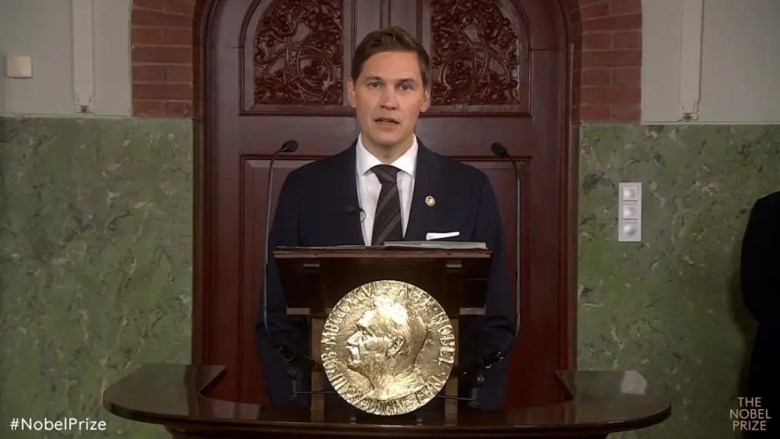Politics
Nobel Peace Prize Committee’s Controversial Decision Sparks Debate

The decision by the Nobel Peace Prize Committee to not award the Nobel Peace Prize for 2025 to Donald Trump has ignited significant controversy and debate. The committee, which has faced criticism for its perceived political biases, opted instead to recognize María Corina Machado, a prominent anti-Maduro advocate currently in hiding in Venezuela.
Critics argue that this choice reflects a broader pattern within the committee, which is reportedly composed mainly of individuals with left-leaning political views. The committee’s chairman, Jørgen Watne Frydnes, defended the decision, stating that the former US president “doesn’t live up to” the criteria expected for the award. Frydnes, who has a background with Médecins Sans Frontières and the Norwegian Helsinki Committee, has faced scrutiny regarding his ability to impartially evaluate candidates for the prestigious award.
The criteria and deliberative processes of the Nobel Peace Prize Committee remain largely opaque, leading to questions about the selection methodology. Frydnes mentioned, “We receive thousands and thousands of letters every year from people wanting to say what, for them, leads to peace.” Yet, his statement did not clarify why Trump was specifically deemed unworthy. Critics suggest that Frydnes’s past affiliations with organizations that have been vocal in political debates, particularly regarding Israel and Gaza, may influence his judgment.
While Machado’s recognition as a courageous figure in the fight for democracy is commendable, many argue that Trump’s contributions to international peace efforts should not be overlooked. Under his administration, several notable agreements were brokered, including efforts aimed at easing tensions between Armenia and Azerbaijan, and initiatives involving Egypt and Ethiopia. These diplomatic strides have been highlighted by supporters as significant achievements in global conflict resolution.
A notable member of the committee, Asle Toje, a political scientist with a PhD from Cambridge University, provides a contrasting perspective. Toje’s expertise in European security and foreign policy could lend some credibility to the committee’s decisions, but it raises questions about the overall balance of viewpoints represented.
The committee’s dismissal of Trump also raises concerns about the impact of political bias on such a prestigious award. Some members have suggested that Trump not only campaigned for the award but that his lobbying efforts were viewed unfavorably. This perception of bias detracts from the legitimacy of the committee’s decisions and can undermine the credibility of the award itself.
The decision not to recognize Trump at this critical juncture may affect the ongoing discourse surrounding international peace efforts, particularly regarding the Ukraine conflict. His role in negotiating diplomatic solutions could be overshadowed by the committee’s stance, raising questions about the direction of future Nobel recognitions.
As the Nobel Peace Prize continues to evolve, the committee faces increased scrutiny over its selection process and the implications of its decisions. The perception of bias, whether real or imagined, risks diminishing the award’s significance as a measure of true contributions to global peace.
This controversy serves as a reminder that the Nobel Peace Prize is not only an honor but also a reflection of the complex and often contentious nature of international relations. The committee’s choices will continue to be under the microscope as they navigate the challenging landscape of political and social advocacy.
-

 Lifestyle4 months ago
Lifestyle4 months agoHumanism Camp Engages 250 Youths in Summer Fest 2025
-

 Business5 months ago
Business5 months agoKenvue Dismisses CEO Thibaut Mongon as Strategic Review Advances
-

 Sports4 months ago
Sports4 months agoDe Minaur Triumphs at Washington Open After Thrilling Comeback
-

 Sports5 months ago
Sports5 months agoTupou and Daugunu Join First Nations Squad for Lions Clash
-

 Top Stories5 months ago
Top Stories5 months agoColombian Senator Miguel Uribe Shows Signs of Recovery After Attack
-

 World5 months ago
World5 months agoASEAN Gears Up for Historic Joint Meeting of Foreign and Economic Ministers
-

 Health4 months ago
Health4 months agoNew Study Challenges Assumptions About Aging and Inflammation
-

 Business5 months ago
Business5 months agoOil Prices Surge Following New EU Sanctions on Russia
-

 Entertainment4 months ago
Entertainment4 months agoDetaşe-Sabah Violin Ensemble Captivates at Gabala Music Festival
-

 Entertainment4 months ago
Entertainment4 months agoBaku Metro Extends Hours for Justin Timberlake Concert
-

 Top Stories5 months ago
Top Stories5 months agoRethinking Singapore’s F&B Regulations Amid Business Closures
-

 Business5 months ago
Business5 months agoU.S. House Approves Stablecoin Bill, Sends to Trump for Signature









